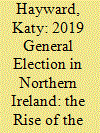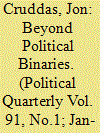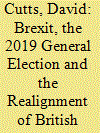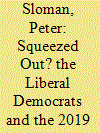| Srl | Item |
| 1 |
ID:
172395


|
|
|
|
|
| Summary/Abstract |
The experience of the 2019 general election in Northern Ireland took a very different course to that of the rest of the UK and, indeed, to the pattern of electoral politics typical of the region. Coming after almost three years with no functioning devolved government, combined with intense disagreement and uncertainty about Brexit, voters were ready to give a message to the two largest parties. Both Sinn Féin and the DUP suffered losses in the election, with the headline outcome being that unionism no longer holds the majority of seats for Northern Ireland in Westminster. More generally, there was a swing from both sides towards centre ground voting, which brought significant gains for the Alliance Party and the SDLP. This article summarises the reasons for this broad trend, focussing on the conditions and electoral pacts which brought it about. It also considers what it might mean for the prospects for Irish unification, noting that a referendum on unification will only be passed by attracting votes from those who tend to see themselves as neither unionist or nationalist.
|
|
|
|
|
|
|
|
|
|
|
|
|
|
|
|
| 2 |
ID:
172399


|
|
|
|
|
| Summary/Abstract |
This article considers the results of the 2019 general election with reference to the Dagenham and Rainham constituency in outer East London. It was a key target for the Conservatives with a 70 per cent leave voting electorate. It did not change hands and might therefore provide insights into the wider debate regarding future coalitions and strategy within the modern left. This article considers these results with reference to arguments about a ‘Brexit realignment’ on the left and whether Labour should rethink the nature of its political ‘base’. It argues for a more nuanced debate than that which currently exists, built around simple binaries organised around Brexit, class, age, education and geography.
|
|
|
|
|
|
|
|
|
|
|
|
|
|
|
|
| 3 |
ID:
172390


|
|
|
|
|
| Summary/Abstract |
The outcome of the 2019 general election—a resounding Conservative majority and an unprecedented defeat for Labour—delivered a decisive electoral verdict for the first time in recent years following a period where British politics has been characterised by instability and indecision. In this article, we draw on aggregate‐level data to conduct an initial exploration of the vote. What was the impact of Brexit on the 2019 general election result? How far has Brexit reshaped electoral politics? Was 2019 a ‘realignment election’? And, if so, what are the implications? With a focus on England and Wales we show that, although the Conservatives made gains deep into Labour’s working class heartlands, these gains have been a long time coming, reflected in Labour’s weakening relationship with working class Britain. As such, 2019 is not a critical election but a continuation of longer‐term trends of dealignment and realignment in British politics.
|
|
|
|
|
|
|
|
|
|
|
|
|
|
|
|
| 4 |
ID:
172393


|
|
|
|
|
| Summary/Abstract |
The 2019 general election was a crushing disappointment for the Liberal Democrats, as Jo Swinson lost her East Dunbartonshire seat to the SNP and the party’s anti‐Brexit stance failed to deliver gains from the Conservatives. Although the Liberal Democrats’ poor performance can partly be blamed on a misfiring campaign strategy, it also reflected the structural difficulties which the party faces in an increasingly polarised political environment. The polarisation of public opinion along multiple axes over the last decade—over austerity, Brexit, and attitudes to Jeremy Corbyn—has fractured the broad coalition of support which the Liberal Democrats assembled during the 1990s and 2000s. Analysis of the 2019 results suggest that the party has made some progress towards developing a new core vote, particularly among suburban Remainers in south east England, but it is not clear whether this will be large or robust enough to have a significant impact on the future of British politics.
|
|
|
|
|
|
|
|
|
|
|
|
|
|
|
|